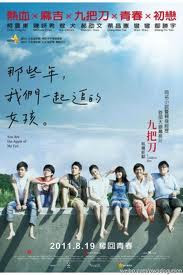 A Sony Music Entertainment, Star Ritz production. (International sales: Sony Music Entertainment, Taipei.) Produced by Adam Tsuei. Executive producer, Angie Chai. Directed, written by Giddens, based on his novel "Na xie nian, wo men yi qi zhui de nu hai."
A Sony Music Entertainment, Star Ritz production. (International sales: Sony Music Entertainment, Taipei.) Produced by Adam Tsuei. Executive producer, Angie Chai. Directed, written by Giddens, based on his novel "Na xie nian, wo men yi qi zhui de nu hai."With a popular blog and more than 50 novels to his credit, Taiwanese personality Giddens (real name Ko Ching-teng) is almost a presold commodity domestically, spelling widespread interest in this, his feature-film debut (he helmed one segment of the portmanteau film "L-O-V-E"). Told in flashback, the story opens with Giddens' alter ego, Ching-teng (Ko Chen-tung), being told to hurry because there's a bride waiting for him. With a bite of an apple and a devilish grin, Ching-teng snaps into a verbose voiceover that accompanies the pic throughout.
Flashing back to 1995, Ching-teng introduces his coterie of buddies from his South Taiwan high school, where sex, not study, is their chief preoccupation. Given that one character is named Boner (Yen Sheng-yu), and Ching-teng has a penchant for looking at Japanese porn and walking around the house naked, the film boasts a sexual frankness that could get it nicknamed "Taiwanese Pie."
Caught participating in a masturbation contest at the back of a classroom, Ching-teng is relocated to a seat in front of Shen Chia-yi (Michelle Chen), the overachieving, puritanical coed he and all his friends are in love with. Dismayed by Ching-teng's academic apathy, Chia-yi is nevertheless won over by his display of chivalry, which rescues her from punishment on one occasion.
The narrative tracks the couple's relationship through their final year of high school and inevitable drifting apart during their college years, at which point the story begins to sag, unable to maintain the outlandish phallocentric humor of its first hour, though the occasional funny gag does slip in. Final quarter sees Giddens overestimating the charm of his own story, but he keeps the pic entertainingly faithful to teen-romance conventions, and even when the jokes subside, the hip music and strong sense of nostalgia are more than sufficient to keep auds engaged.
While Giddens mostly keeps the proceedings slick and pacey (including three musical montages), the pic's casting is its greatest asset. True to his flamboyant clown character in every way, newcomer Ko is captivating as the male lead; present in nearly every scene, the thesp carries the picture in outstanding fashion. Exhibiting greater range than her co-stars, Chen makes it easy to believe all the boys love Shen. Supporting thesps are all splendid, though a couple of characters could easily have been dropped without being missed.
Lensing by Chou Yi-hsien reps a potpourri of bright colors matching the lighthearted tone, offset by the drab blues and grays of the high-school buildings. Production companies Sony and Star Ritz don't skimp on the tech credits, making this a much more robust production than many similar youth-skewing Taiwanese romancers over the past decade.
Mandarin title translates as "Those Years, We Chased After the Same Girl."
No comments:
Post a Comment